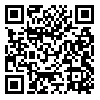Volume 20, Issue 3 (Autumn 2025)
Salmand: Iranian Journal of Ageing 2025, 20(3): 400-421 |
Back to browse issues page
Download citation:
BibTeX | RIS | EndNote | Medlars | ProCite | Reference Manager | RefWorks
Send citation to:



BibTeX | RIS | EndNote | Medlars | ProCite | Reference Manager | RefWorks
Send citation to:
Sharafi V, Mohammadyari Z. Applications of Artificial Intelligence in Geriatric Care Management: A Meta-synthesis Approach. Salmand: Iranian Journal of Ageing 2025; 20 (3) :400-421
URL: http://salmandj.uswr.ac.ir/article-1-2837-en.html
URL: http://salmandj.uswr.ac.ir/article-1-2837-en.html
1- Department of Management, Faculty of Humanities, Hazrat Masoumeh University, Qom, Iran. , v.sharafi@hmu.ac.ir
2- Department of Management, Faculty of Literature and Humanities, University of Ilam, Ilam, Iran.
2- Department of Management, Faculty of Literature and Humanities, University of Ilam, Ilam, Iran.
Abstract: (5607 Views)
Objectives With the growth in the aged population and the increase in the health needs of older people, new challenges have been raised for the health care systems. Therefore, advanced methods for management of the health needs of older adults is needed. Artificial intelligence (AI) can play an effective role in this field. The present study aims to investigate the different applications of AI in geriatric care management.
Methods & Materials The is a qualitative review study using the meta-synthesis approach. The related articles were searched in national and international databases. The identified data were coded and analyzed in MAXQDA software, version 2020.
Results A total of 25 articles were selected for the review. From 122 initial codes, 8 main themes, 21 sub-themes or concepts, and 42 indicators were extracted. The main themes included prediction and prevention of diseases, management of chronic diseases, organization and sorting of medications, smart home monitoring, online communication with doctors, car assistance systems, health service management, and psychological support.
Conclusion The AI technology can be used to manage the health needs of older adults. Its different applications should be taken into consideration in geriatric care management.
Methods & Materials The is a qualitative review study using the meta-synthesis approach. The related articles were searched in national and international databases. The identified data were coded and analyzed in MAXQDA software, version 2020.
Results A total of 25 articles were selected for the review. From 122 initial codes, 8 main themes, 21 sub-themes or concepts, and 42 indicators were extracted. The main themes included prediction and prevention of diseases, management of chronic diseases, organization and sorting of medications, smart home monitoring, online communication with doctors, car assistance systems, health service management, and psychological support.
Conclusion The AI technology can be used to manage the health needs of older adults. Its different applications should be taken into consideration in geriatric care management.
Type of Study: Research |
Subject:
gerontology
Received: 2024/04/27 | Accepted: 2024/08/26 | Published: 2025/10/01
Received: 2024/04/27 | Accepted: 2024/08/26 | Published: 2025/10/01
Send email to the article author
| Rights and permissions | |
 |
This work is licensed under a Creative Commons Attribution-NonCommercial 4.0 International License. |








